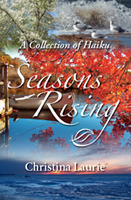
Calling All Haiku Poets
Haiku Poet Christina Laurie discusses the Sixth Annual Haiku Contest
What is the background of the Haiku Contest?
The contest began six years ago, when then National NLAPW President Anna DiBella of Huntsville, NY, was a guest speaker at a branch meeting. She challenged the Cape Cod branch to reach out to do something for the community, since we are a 501c.3 organization.
The branch came up with the Cape Cod Writers Conference as a recipient of the contest proceeds. I suggested running a haiku contest for Pen Women, because none was run at the time. The branch voted to accept this proposal, if I would run it, so I have done so for the past six years. It has been entertaining, informative and fun reading haiku from all over the country. Two years ago, National Past President Anna DiBella, an accomplished haiku poet herself, volunteered to be the judge.
Who typically submits poetry?
Haiku are submitted from men and women across the country. Many are Pen Women, but some read about it in the newspaper or in The Pen Woman, the NLAPW National magazine. The contest is open to anyone.
Last year there were 142 entries from 16 different states and the District of Columbia.
How does this event benefit Cape Cod's young writers?
Each year, two students receive a scholarship to attend the Young Writers workshop of the Cape Cod Writers Center's annual summer writers conference, held at Craigville Beach resort during the third week in August.
As a Haiku Poet yourself, how do you feel about the contest and the opportunities it offers?
As one who has published haiku internationally and nationally since 1976, I am eager to share this type of verse. Many people think haiku is just a three-line poem, but it is so much more.
The most important factor is that the third line is an "ah-ha" moment which adds dimension and depth to the verse. Often it is a line that adds a totally different thought. Haiku are supposed to make you think - to carry on the mood of the haiku.
Other important factors are that haiku never have titles, they often don't have punctuation (because it remains open to carry on the verse), it refers, either subtly or outright, to a season, and it stays to the 5-7-5 syllabic three line form.

Seasons Rising: A Collection of Haiku
is Christina Laurie's second book and
first book of poetry.
Separated into the four seasons, the book is illustrated with beautiful duo-chrome photos, contributed by Lily Kuo, set behind each haiku.
Available at Creations by Christina
 |
The Winning Entries of the
2010 Haiku Contest:
Award of Excellence
lone goose flees winter
hides behind cattail curtains
arrow in her breast
Katherine Sherin-Zauner, Venice, Fl
First Prize
Ancient crooked pine
growing out of the boulder
red tail hawk hovers
Second Prize
Wild lilac, lupine,
Irises in a garden
Three shades of purple
Sandi Nielubowicz, Santee, CA
Third Prize
Bleeding color
in an oil-slicked puddle
broken-spined kite
Lorraine E. Smits, Green Bay, WI
The Cape Cod Branch of the
National League of American Pen Women (NLAPW) announces the Sixth Annual Haiku Contest
in honor of poetry month, April 2011.
Their goal is to sponsor two youths attending the
August 2011 Cape Cod Writers Conference
in Craigville, MA.
Postmark deadline
Tuesday, April 26, 2011
$3 per haiku
or $10 for maximum of four
Prizes to be awarded to 1st, 2nd and 3rd place
with a book & $15, $10 and $5, respectively.
Winners will be announced on the
NLAPW web site in May 2011
www.AmericanPenWomen.org
Please type each haiku on
one-half of an 8 1/2"x 5 1/2" sheet
On the back of each sheet, write
name, address, phone & email address
.
Send entries to: Haiku Contest, PO Box 936,
West Falmouth, MA 02574

Born in Worcester and retiring to Cape Cod after raising three children in the Boston area, Christina Laurie writes full time.
She is a retired Methodist minister and author of three children's books and two biblical profile books, a devotional book and a memoir.
A prize winning poet, she is presently working on a murder mystery. She continues to write haiku as she travels, skis, swims and kayaks.
She is the national chaplain for the National League of American Pen Women (NLAPW) and is a past president of the Cape Cod Branch of the NLAPW.
PreacherPoet@comcast.net
Creations by Christina
(508) 540 0762
